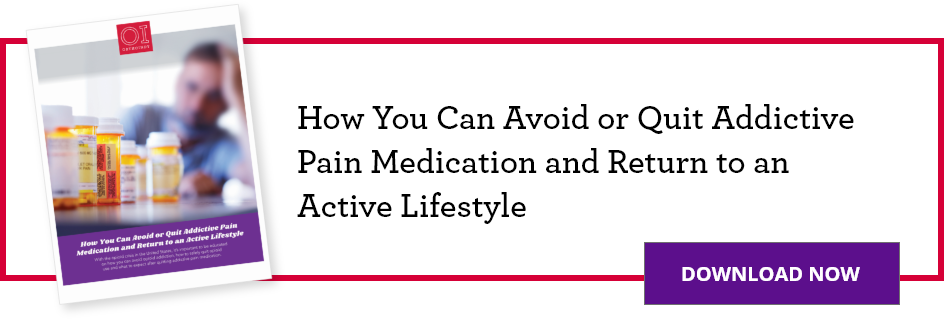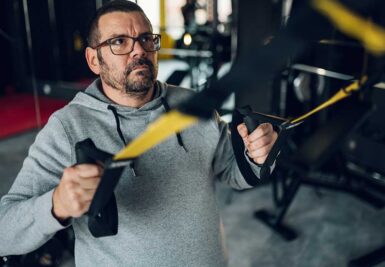THIS POST IS PART OF THE ULTIMATE GUIDE TO NON-SURGICAL ORTHOPEDIC CARE
In the middle of the opioid epidemic in the United States, many people are concerned about the growing problem and what health care professionals are doing to find a solution.
At OrthoIndy, physicians share that concern about the risk that opioids pose when not used appropriately or when used without a correct medical diagnosis. OrthoIndy physicians strive to prevent the misuse of opioids and the possible effects it may have on individual patients, their families and our society.
“With the ease of prescribing pain medication in the United States some doctors are handing out opioid pain medication as a first line treatment for any type of pain,” said Dr. Nicholas Jasper, OrthoIndy physiatrist. “But that’s not the answer patients need.”
What’s the alternative to opioids?
Dr. Jasper is one of many OrthoIndy physiatrists who specialize in physical medicine and rehabilitation and aims to treat musculoskeletal and nerve related conditions in a non-operative manner through the use of non-opioid medication, therapy and minimally invasive procedures.
Although physiatrists do not perform traditional surgery, it is important to note that they do not heavily rely on addictive opioid pain medication to treat patients. In fact, it’s the opposite.
“The fact the United States consumes 99 percent of the world’s supply of hydrocodone has been eye-opening for some of my patients. They want to know how people in other countries manage pain without opioid use,” said Dr. Jasper.
How can a physiatrist help you avoid opioid medication?
Managing pain without opioid use is exactly the service that OrthoIndy physiatry provides. The physiatry team focuses on a treatment plan that allows the patient to return to their pre-injury activity levels without relying on opioid pain medication.
“I have some patients that see me for the first time and are taking more opioid pain medicine than they can handle, and they still aren’t finding relief,” said Dr. Jasper. “In fact, a lot of patients think they can’t live without them, but with the right treatment options, they can.”
According to Dr. Jasper, it all comes down to diagnosing the problem and coming up with a treatment plan to help the patient wean off the narcotic pain medication. Treatment may include controlled medication, physical therapy, injections or other non-invasive procedures.
“It’s important to see a physiatrist before resorting to taking opioid pain medications,” said Dr. Nicholas Jasper, OrthoIndy physiatrist. “Opioids are often a ‘knee-jerk’ reflex to treat pain and it’s perceived by many that opioids are ‘the magic pill,’” said Dr. Jasper.
Instead, 90 percent of patients who suffer from neck and back pain have symptoms controlled with a non-operative treatment plan – a plan that does not involve opioids for back pain.
“The truth is physicians truly help patients when they take the time to listen to the patient’s complaints, examine them and explain the diagnosis and possible treatment options,” said Dr. Jasper.
Learn more about non-surgical orthopedic care at OrthoIndy.
Schedule an appointment
Your well-being is important to us. Click the button below or call us to schedule an appointment with one of our orthopedic specialists. If your injury or condition is recent, you can walk right into one of our OrthoIndy Urgent Care locations for immediate care. For rehabilitation and physical therapy, no referral is needed to see one of our physical therapists.






